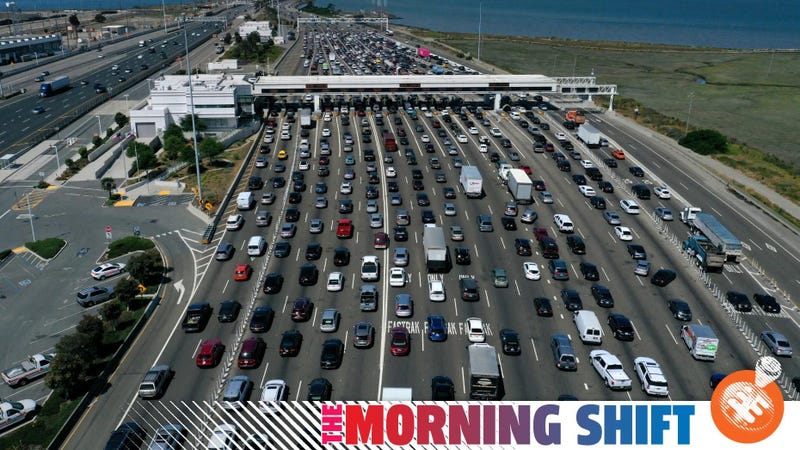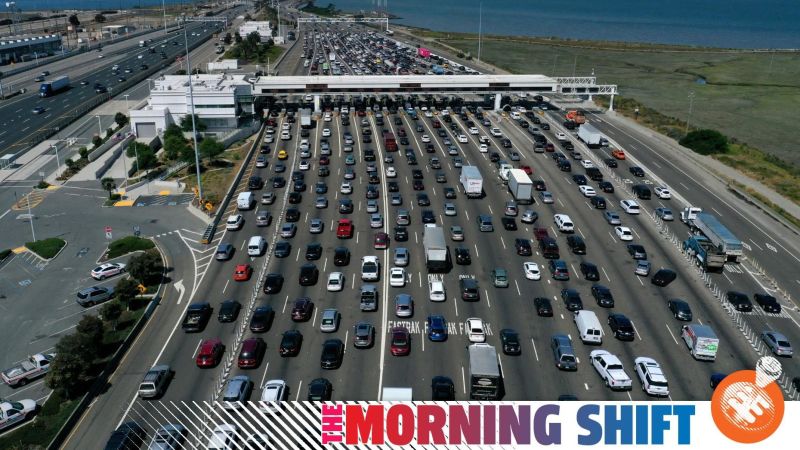
 The Morning ShiftAll your daily car news in one convenient place. Isn’t your time more important?
The Morning ShiftAll your daily car news in one convenient place. Isn’t your time more important? California might not be allowed to set zero-emissions standards anymore, GM workers in South Korea are about to strike, and automakers are desperate to avoid a no-deal Brexit. All this and more in The Morning Shift for Friday, September 6, 2019.
1st: No Authority For California?
California’s been setting its own standards for greenhouse gas emissions for decades now (and 13 other states follow its lead), and it’s pretty adamant it should have the authority to keep doing that. But the federal government under President Trump, which has been trying to roll back Obama-era fuel economy standards, is not too keen on that continuing.
Now, as reported by the Wall Street Journal, two federal agencies are trying to curtail that a bit.
The EPA and Department of Transportation are the two agencies in question. The plan here seems like it would lay the groundwork for limiting or ending California’s ability to set its own emissions rules.
Advertisement
From the story:
As part of that effort, officials could move within the next few days to curb California’s influence on the car industry, say these people and others familiar with the administration’s thinking. That could be a more aggressive attempt to end its longstanding authority to set its own emissions rules or threats to dissuade auto makers from collaborating further with the state, these people say.
The White House has been proposing to ease requirements originally set under the Obama administration. The Environmental Protection Agency and the U.S. Department of Transportation are overseeing the rule-making process.
Auto makers are worried the administration’s efforts are too confrontational with California and will result in a protracted legal battle between the federal government and the nation’s most populous state. That could force manufacturers to meet two sets of tailpipe-emissions standards for selling cars and trucks in the U.S., a scenario industry executives say will compromise future vehicle planning.
To ensure some certainty in future years, Ford Motor Co. , Honda Motor Co., BMW AG and Volkswagen AG struck an agreement this summer with California to voluntarily meet a new set of standards that are tougher than the White House’s proposal—but tamer than the Obama era ones.
[…] “Quite frankly our rule is realistic, it’s a realistic and transparent fuel-economy standard that will reduce auto pollution—unlike what California is doing,” White House spokesman Judd Deere said. “Our focus is finalizing the rule.”
Advertisement
And a quick reminder what we’re talking about, via Reuters:
The Obama-era rules called for a fleetwide fuel efficiency average of 46.7 mpg by 2025, with average annual increases of about 5 percent, compared with 37 mpg by 2026 under the Trump administration’s preferred option to freeze requirements.
Advertisement
Automakers, for the record, generally don’t like all this infighting—the court battles could create uncertainty over standards for years. In June, 17 car companies drafted a letter calling for a compromise between existing policies and the Trump proposal to rollback Obama-era emissions regulations, but that was rejected by the White House. So four automakers—BMW, Honda, Ford and Volkswagen—went and did it anyway.
California and other states will be taking to the federal appeals court today to protest the Trump administration’s decision.
Advertisement
2nd: South Korean GM Workers To Strike
Unionized General Motors workers in South Korea have plans to strike on both next Monday and Wednesday regarding stalled wages and plant shutdowns, Reuters reports. It will be the first full strike since GM bought the plant in 2002.
Advertisement
The last straw in this situation came after the union rejected GM’s plans to freeze wages and not offer bonuses for the second year in a row.
Here’s more history from the Reuters article:
Last year, the government injected 850 billion won ($712.85 million) into the money-losing unit after the U.S. automaker considered pulling out of the country. GM shut one of its four Korean factories following its pullback from major export market Europe and cut around 3,000 jobs.
The government at the time said the injection would keep GM in South Korea for at least another 10 years. Even so, union officials continue to be concerned about further closures and job losses.
GM has not offered any production plan for No.2 plant in the city of Bupyeong after 2022, union officials said.
GM Korea has said it will shift production of its Trax crossover to the plant from another nearby factory starting late this year. It did not provide longer term plan when contacted by Reuters.
Advertisement
That is, largely, not a hugely promising plan for the future, and workers are recognizing it:
“What crazy person will stage a full strike for three days under this economic situation? We are going on a strike because we are desperate,” said a GM Korea union leadership official.
“We are fine with no wages, but we want to hear GM’s vision about the Korean unit,” said the official, who declined to be identified due to the sensitivity of the matter.
Advertisement
GM, for its own part, is spinning a little bit of the blame back on the union. The company needs union support to be able to break even this year—but it’s asking workers to sacrifice their pay increase in order to get there.
3rd: UK Automakers Fear No-Deal Brexit
The United Kingdom has come down to two options regarding the whole Brexit situation: it delays Brexit until after October 31 to allow for a deal to be struck with the European Union, or it leaves immediately with no deal in place.
Advertisement
Automotive News Europe is reporting that automakers are really hoping it’ll be the former.
Given that the automotive sector is one that would suffer most in this situation, it makes sense. Here’s more from the article:
“Leaving without a deal would be the worst outcome,” the Chief Executive of the Society of Motor Manufacturers of Traders (SMMT) Mike Hawes told Reuters.
“If it takes an extra couple of months to get that deal, I think the industry would put up with that,” he said.
Figures published by the SMMT in July showed investment in Britain’s car sector fell by more than 70 percent in the first half of the year to 90 million pounds ($111 million), although a major investment by Jaguar Land Rover will boost the full-year figure.
“Investment in the UK has effectively stopped,” said Hawes.
“It has, because they (investors) fear no-deal. That will make it very, very difficult to continue to have the certainty and confidence to invest in the UK.”
Advertisement
Brexit’s had more delays than Chinese Democracy at this point, but regardless, it’s definitely not the ideal time to be an international exporter.
4th: China Has Lofty Electric Goals
By 2035, China wants 60 percent of all cars sales to be electric, Bloomberg reports. That goal is pretty high, but it may be attainable.
Advertisement
From the article:
China’s Ministry of Industry and Information Technology is spearheading the government’s latest auto industry plans for 2021 through 2035, said the people, who asked not to be identified discussing matters that haven’t been made public. The proposals are still under discussion and subject to change, according to the people. The ministry said in July that it plans to disclose a draft of the targets by the end of the year.
Advertisement
If 60 percent sounds like a pretty high number, that’s because it is:
The 2035 target would represent a 12-fold jump in the proportion of NEVs sold now, which stands at about 5%, and adds pressure for global carmakers to electrify their fleets to compete in the world’s largest car market. China typically sets national-level goals for high-priority industries to help guide Beijing in setting measures such as subsidies and tax breaks.
Though exact comparisons weren’t immediately available, BloombergNEF estimates that NEVs — excluding commercial vehicles — will account for 56% of total passenger vehicles in China by 2035.
Advertisement
Given that the government has been scaling back subsidies for electric automakers recently, it seems like this decision might encourage China to re-incentivize the whole EV deal in order to meet their standards
And since China is the largest producer of EVs, what happens there sets the stage for the rest of the world. Encouraging people to buy more and more electric cars in China could theoretically ripple out to the rest of the world.
Advertisement
5th: Nobody’s Talking About The GM-Trump Meeting
Yesterday saw President Trump meeting with GM’s CEO Mary Barra, which was basically intended to clear the air about all the frequent Twitter criticisms that come from the president. But nobody’s talking about what was said or agreed to, if that even happened.
Advertisement
From The Detroit Free Press:
Barra, leaving the White House, said only, “We had a productive and valuable meeting,” according to CNBC.
GM declined to offer an outline of the discussions, saying, “Our executive team regularly meets with policymakers; we do not disclose details of those meetings.”
Advertisement
White House officials also declined to offer a more enlightening comment about their discussions, leaving the world to speculate. At least until Trump takes to Twitter.
Reverse: First-Ever Tank Produced
From History.com:
On September 6, 1915, a prototype tank nicknamed Little Willie rolls off the assembly line in England. Little Willie was far from an overnight success. It weighed 14 tons, got stuck in trenches and crawled over rough terrain at only two miles per hour. However, improvements were made to the original prototype and tanks eventually transformed military battlefields.
Advertisement
Neutral: Should States Be Able To Set Their Own Emissions Standards?
While it seems strange to have different levels of autonomy over the rules regarding the cars that inhabit a state all across the country, state autonomy is a pretty important part of what makes America so unique. But should that freedom also extend to cars?













